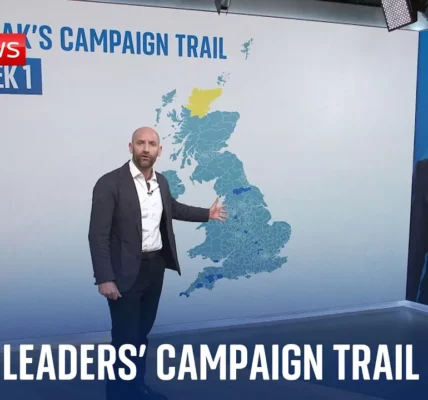Countdown to the General Election: Insights from Mel Stride

As the general election approaches, key figures from the Conservative Party, including Work and Pensions Secretary Mel Stride, share critical insights into the potential ramifications of a Labour government, tax policies, and the importance of Conservative representation. This article delves into these discussions and highlights the stakes involved in the upcoming election.
Introduction
With less than 24 hours until voting opens for the general election, the political climate is charged with anticipation and debate. In a recent interview, Mel Stride, the Work and Pensions Secretary, articulated the Conservative Party’s stance on key issues, including tax increases, pension policies, and the potential consequences of a Labour government under Keir Starmer. This article aims to explore these pivotal topics and their implications for voters.
The Conservative Perspective on Taxation
One of the central themes discussed by Mel Stride was the Conservative Party’s approach to taxation compared to Labour’s proposals. Stride emphasized the potential for significant tax increases should Labour come into power, claiming that this could lead to the highest tax burden in the UK since 1948.
Key Points on Taxation
- Under Labour, millions could see their state pensions taxed, impacting the retirement income of many pensioners.
- The Conservative Party aims to reduce taxes further, contrasting Labour’s projected tax hikes.
- Historical context: The tax burden has reportedly reached levels not seen in over 70 years under Conservative leadership, raising concerns about economic sustainability.
The Importance of Conservative Representation
Stride highlighted the necessity of having sufficient Conservative Members of Parliament to ensure accountability and opposition to potentially harmful policies from a Labour government. He raised concerns about the idea of a “super majority,” which could lead to unchecked governmental power.
Consequences of a Super Majority
- Reduced checks and balances within Parliament.
- Potential for rapid implementation of controversial policies without opposition.
- A risk of increased taxes and diminished public services without adequate representation.
Achievements Under Conservative Leadership
When asked about his accomplishments, Mel Stride pointed to several areas where he believes the Conservative government has made significant progress, particularly in supporting vulnerable populations and managing the economic fallout from the Covid-19 pandemic.
Support for Pensioners
Stride noted the increase in pensions, asserting that:
- Pensions were raised by approximately 10% recently.
- 200,000 fewer pensioners are now living in poverty compared to the last Labour government.
Tax Cuts and Economic Stability
Stride also mentioned the following points regarding tax cuts:
- Average earners are paying the lowest marginal tax rate in decades.
- Conservative policies aim to alleviate the financial burden on low-income households.
The Labour Alternative: A Risky Proposition
Stride did not shy away from discussing what he views as the dangers of a Labour government. He asserted that Labour’s historical policies have led to economic downturns and increased poverty rates.
Historical Context of Labour Policies
Some of the critiques included:
- The last Labour government saw significant pensioner poverty, ranking the UK fourth highest in Europe.
- Concerns over Labour’s tendency towards austerity measures and cuts to public services.
Conclusion
As the general election draws near, the stakes are high for the British public. Mel Stride’s insights provide a glimpse into the Conservative Party’s vision for the future, emphasizing the implications of a Labour government. Voters must consider the potential consequences of their choices, particularly regarding taxation and representation in Parliament. Engaging in this election is crucial—your vote can shape the economic landscape for years to come. For further insights on the election and its impact, check out our related articles on political accountability and economic policies.
“`




